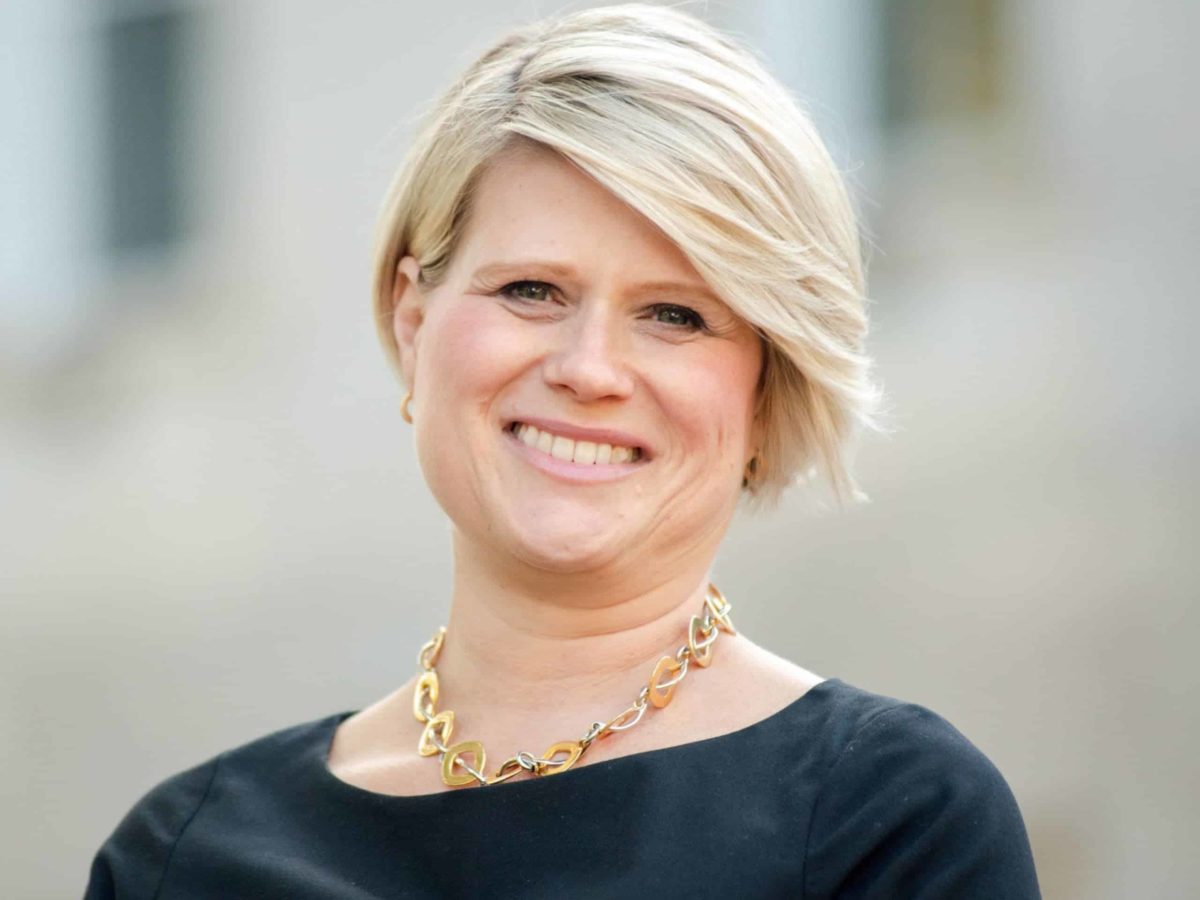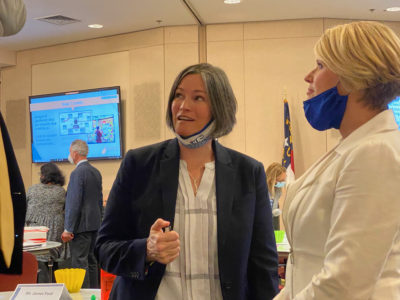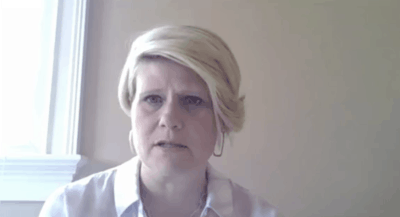

A video of State Superintendent of Public Instruction Catherine Truitt delivering comments and answering questions from the Orange County Republican Party was making the rounds this past weekend. In it, she touches on everything from critical race theory, to student surveys, to social studies standards, to the Department of Public Instruction.
You can see the full video, which was posted to YouTube June 11 by the Orange County Republican Party, below. Below that, we’ve pulled out some quotes from the video.
On critical race theory
An Education Week article describes critical race theory this way:
“Critical race theory is an academic concept that is more than 40 years old. The core idea is that racism is a social construct, and that it is not merely the product of individual bias or prejudice, but also something embedded in legal systems and policies.”
Truitt talked about something that she called critical race theory at length in the video, saying that she has been working on it since her third day in office. She also references a bill (HB 324) that passed the House but has not yet been heard in the Senate. The bill seeks to limit how teachers can teach about race in classrooms. Some proponents have said it bans critical race theory, but the bill neither mentions critical race theory, nor is it clear that the provisions of the bill refer to tenets of critical race theory. Here is some of what Truitt said on critical race theory:
“You all know that when the House filed their bill that would make critical race theory in our schools illegal, I stood up for that bill. I said I publicly supported it. I was quoted in the media as supporting it, much to the disappointment of a lot of people in the education community, because like I told you, Republicans don’t tend to work in the education community.
“And so, what I can … this is what I know about critical race theory. This is an academic movement that started 30 or 40 years ago. I know my husband told me when he started law school there was this kind of group that was on its way out. You know you have like different kinds of legal theory? One of those were the ‘Crits.’ Those were the people who thought that critical race theory was a real thing worth discussing in the way that laws are racist. And but it wasn’t something that was really taken very seriously.”
Truitt goes on to give her definition of critical race theory:
“It’s the idea that every aspect of American society is racist. That racism permeates every aspect of our society, even though we have laws that we have passed and enacted on the books that are moving us towards a more perfect union. Okay. That is what critical race theory is. Critical race theory proponents also believe that because those laws were in place in 1783, that they can never really be amended, and therefore our nation will always be flawed. And that, my friends, goes against my core belief as a Christian.”
On whether or not Senate will take up HB 324
“So, what I think is that they don’t want to touch it because they don’t want the publicity, but I don’t know that for sure … they want companies like Apple and Google to come to North Carolina, who will say, ‘No, we’re not going to come to a state that bans what teachers can teach or not teach,’ because that’s the way the other side sees it.”
Editor’s Note June 15, 2021: On June 13th, Truitt sent out a series of clarifying tweets on this statement. Pat Ryan, spokesperson for Senate President Pro Tem Phil Berger, R-Rockingham, said in an email that the clarifying tweets came out following a conversation between Berger’s office and Truitt’s. The tweets are below.
On the State Board’s social studies standards
The Board recently passed new social studies standards, which were the focus of a lot of opposition from Republicans on the Board and sparked increased scrutiny of how the Board is thinking about and addressing equity. Much of the debate focused on the use of words such as “racism,” “discrimination,” and “identity.” The standards didn’t garner Republican Board member support even though those words had been changed from what was originally in the draft standard: the terms “systemic discrimination,” “systemic racism,” and “gender identity.” While Truitt does not have a vote on the Board, she was involved in revising a previous version of the standards to simplify those terms to their final version.
Here is some of what Truitt said about the standards in the video:
“When the social studies standards, that were supposed to be in their final draft form, were presented at my first State Board of Education meeting … the majority of that work had already been done when my predecessor was in that office.”
“And so I inherited a large bureaucratic agency that quite frankly was a mess. And so, when I requested at that meeting that I have more time to review the standards, I was told you have two weeks. So, the standards, that’s about a 1,000-page document because it’s K-12.
“And then, when we gathered the next time, I was told, you can’t make any changes to the standards themselves because the legislature has put a timeline on when they have to be implemented. So, only the legislature has the power to delay the standards. So what I was able to do was to take out of the glossary of the standards the terms ‘systemic racism,’ ‘gender identity,’ and ‘systemic discrimination.’ That was all, that was all I could do.”
On parents’ right to know what students are being taught
“All parents have the right to schedule an appointment with a building principal and see their child’s class when they want. That is not policy that’s dictated by the state, but that is every school’s policy. And as it should be.”
“Let me say also: You know the bills that have been filed about teachers, requiring teachers to post their materials online? When I taught in Johnston County … I used a virtual learning environment called Moodle … I posted everything in Moodle and any parent could access it at anytime. So, you know, get over the bellyaching.”
On equity
“Equity is not supposed to mean ensuring equal outcomes. That’s impossible. Equity in education is supposed to mean giving students what they need when they need it. Take, for example, a child who has special needs. It costs more money to educate a child with special needs.
“When we talk about equity in education, what we’re saying is, ‘OK, this student is blind. So we need to accommodate the needs of the student. And perhaps we need to make some structural changes to a building to allow someone in a wheelchair or something else.’ That’s what equity means.
“It could also mean our academically gifted program. It could mean making sure that we give the funding and support for our high fliers … it means making sure that all children have … it means making sure that kids who don’t know English are learning English at school. That’s what equity means.
“So I have an Office of Educational Equity at DPI. And my deputy who has that position is very clear that equity is not just about seeing things through a racial equity lens, it’s about an all-children equity lens. And again, it doesn’t mean assuring equal outcomes. It means giving all children what they need when they need it.
“And again, that includes low-income, white children. It includes Hispanic children. It includes Black children, it includes Asian children. It includes children with special needs. It includes our high fliers. All children. If you have more than one child, you know they all have different needs. That’s what equity is.”
On surveys
“We would like to give a survey when, as kids come back from the pandemic, that is about what’s happening at school. Not about what’s happening at home. I’ve seen the questions myself. They are not invasive. They ask: How do you think things are going at school? Are you struggling in school?
“Let me tell you something. I have been all over the state … we are seeing kids come back to school who have been neglected for a year. We had a kid come back who had not been bathed for a year.”
“It’s a slippery slope when you start talking about how parents don’t know what they’re doing, because we all know what we’re doing with our children and grandchildren. But I’m here to tell you. I have been in education my entire adult life, and there are a lot of bad, evil adults in this world who have children … we are trying to ascertain what kids have been through this past year.”
On students wearing masks in schools
“So, I am getting ready to join with the House in calling for the governor to lift the mask … requirement. Every month, DHHS gives a report at the State Board of Education meeting, and every month … I am on record as saying, ‘What metrics are you going to use to determine when the mask is going to come off?’ And they give me a five minute answer, and I say, ‘So you don’t know?’
“And the truth is that they’re waiting, Governor Cooper is waiting for the CDC to tell him what to do, because that’s how he has managed everything with the pandemic.”




